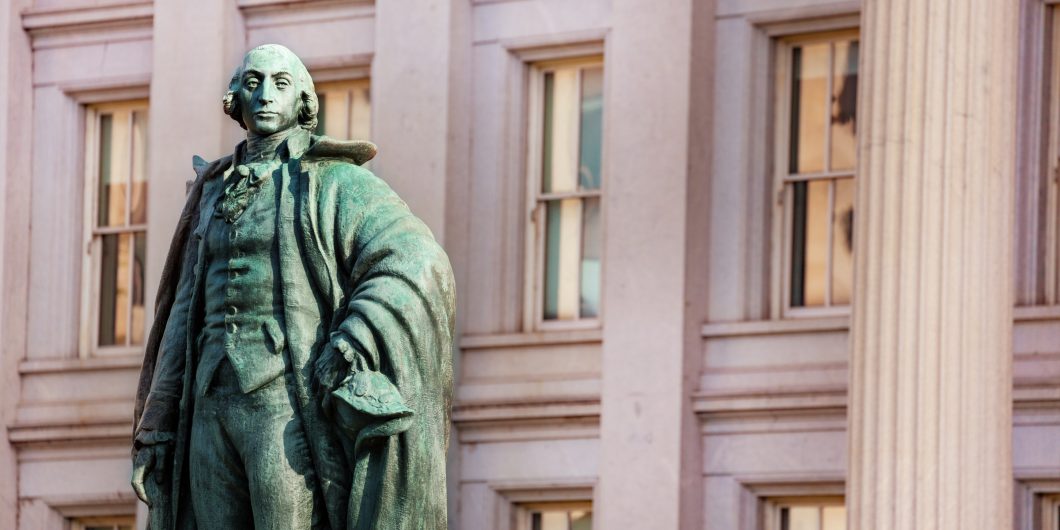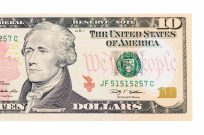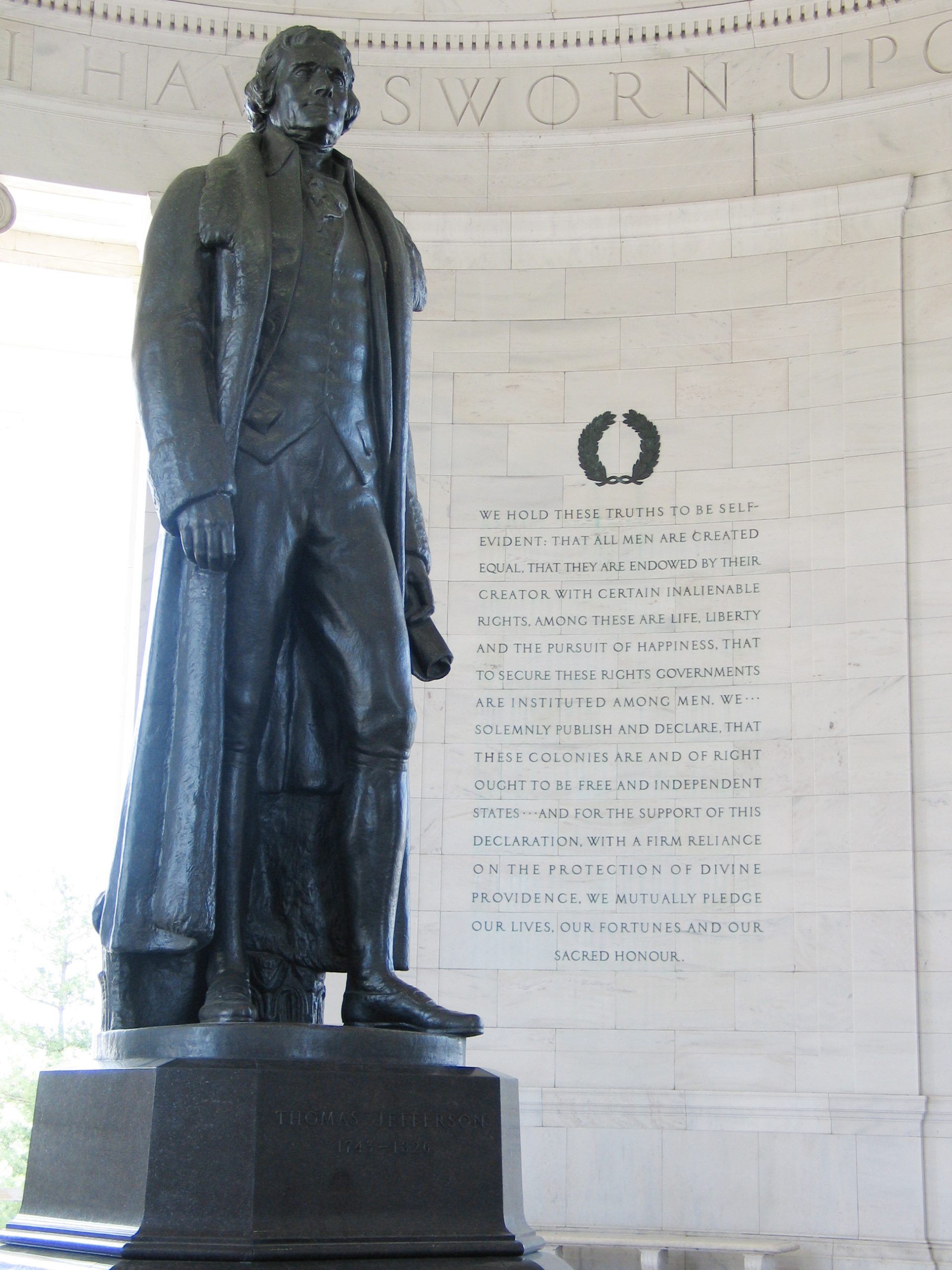In Debt to Albert Gallatin
The national government’s mounting debt may well be the worst but least talked about bad news story of the twenty-first century. President after president and Congress after Congress, the situation worsens. In these polarized times, the only thing Democrats and Republicans agree on is more spending and borrowing.
Amid this spendthrift self-destruction, it’s tempting to conclude that fiscal discipline is too much to ask of officeholders. But then we consider the example of Albert Gallatin.
Albert Who?
Those who have never heard his name can be forgiven. Gallatin has long been eclipsed by Alexander Hamilton, his swashbuckling predecessor as Secretary of the Treasury, who in the 1790s made the national government’s assumption of the states’ Revolutionary War debts the basis of the Federalists’ controversial financial program. After Hamilton took on this debt, it was Gallatin who put plans in motion to pay it off.
Gallatin served as Treasury secretary under both Thomas Jefferson and James Madison. He’d be notable solely for his unsurpassed longevity in that office. Yet even more significant is that, between Jefferson’s inauguration in 1801 and 1812, the year of Madison’s reelection, the national debt fell from $83 million to $45 million—little more than half of where it stood when Gallatin took charge of America’s finances.
The War of 1812 pushed the debt back up, but afterwards paying it down returned as the nation’s budgetary priority. Gallatin’s basic policy remained in place until, under President Andrew Jackson, the national debt reached zero.
With Gregory May’s Jefferson’s Treasure: How Albert Gallatin Saved the New Nation from Debt, Gallatin has a biography worthy of his accomplishments. May’s account exemplifies Gallatin’s energy, good humor, precision, and importance. While not the first modern treatment of the fourth Treasury secretary’s contributions, it is the fullest, most exhaustively researched, and best at balancing his public and personal lives with the times he helped shape.
American by Choice
Whether inspired by the ideals of the American Revolution or merely the promise of adventure and opportunity, Geneva-born Gallatin arrived in Boston as a 19-year-old in 1780. Soon tiring of New Englanders, who struck him as joyless and intolerant, he traveled the Appalachian backcountry, surveying land and becoming a U.S. citizen. In 1786 he settled down, purchasing a 370-acre farm that signaled his status as one of the more prosperous men in southwestern Pennsylvania.
What drew him to politics was the debate over ratification of the Constitution. Concerned it might concentrate too much power in the hands of too few, Gallatin gravitated toward the Antifederalist position of his neighbors, who elected him to a special convention in Harrisburg that proposed possible amendments. Soon they sent him to the state legislature in Philadelphia, capital of Pennsylvania as well as the new national government, for which in 1793 he was selected to fill a Senate seat “even though he warned,” May writes, “that he may not have been a citizen for the nine years that the Constitution required.”
At this point the 32-year-old, already a widower, won the affection of Hannah Nicholson, 26, member of a well-connected New York family that shared his growing allegiance to the Republican party of Jefferson and Madison. Although his first wife had described him as “perhaps not a very handsome man” but as appealing in more important ways, Gallatin confided to a friend that Hannah’s appearance was “far less attractive than either her mind or her heart.” The new marriage, May observes, “was a good match.”
Gallatin was no less blunt with his praise than he was stingy with his purse. In 1792 he admitted that, instead of buying new winter clothes, he had purchased Hume’s History of England, Gibbon’s Decline and Fall of the Roman Empire, and Blackstone’s Commentaries on the Laws of England. The degree to which he prioritized liberty as well as frugality became apparent in his principled resistance to Hamilton’s financial program, which included not only assumption of states’ debts but also an inefficient and onerous excise tax on whiskey.
Gallatin remained in opposition to the whiskey tax even after Federalists, in a party-line vote, expelled him from the Senate because of uncertainty over the date he became a citizen. Since Pennsylvanians initially voted for congressmen not by district but at-large, on a single statewide ballot favoring the populous eastern part of the state, the measure struck farmers in Pennsylvania’s west as taxation without representation. Gallatin rallied opposition to the tax—yet also counseled his neighbors not to resist the federal force that in 1794 put down the Whiskey Rebellion. That year, voters elected him to the House of Representatives.
Congressman Gallatin published his Sketch of the Finances of the United States, which overturned “Republican orthodoxies” while making an argument based on quantitative analysis. By 1796, Madison wrote to Jefferson that Gallatin was “a real Treasure.” As May points out, little time passed before “Jefferson caught Madison’s enthusiasm” for the native French-speaker.
Jefferson’s Treasurer
After Madison left Congress in 1796, Gallatin emerged as the Republicans’ point man, opposing the creation of a costly military establishment and unthinking acquiescence to the “public curse” of Hamiltonian finance—which made deficit spending seem so easy. Meanwhile, Jefferson, after placing second in that year’s presidential contest, became John Adams’s vice president. The Jefferson-Gallatin relationship deepened during the Adams presidency, which Jefferson believed threatened, through such measures as the 1798 Sedition Act, the hard-won gains of the American Revolution. Federalists, meanwhile, viewed the French Revolution as the threat, especially after the Reign of Terror and France’s Quasi-War with the United States. As May points out, French-speaking “Gallatin took more than his fair share of verbal abuse because he was the very incarnation of Federalist anxieties.”
Of course, the same held true for Jefferson, who as America’s ambassador in Paris had been present for the first scenes of the French Revolution. Federalists portrayed him as a bloodthirsty, atheist French Revolutionary eager to unleash a Reign of Terror in the United States. His Republican allies, seeking to situate him within the mainstream of American Revolutionaries, pointed out that he had drafted the Declaration of Independence.
Jefferson won this contest of opinion and in 1801 appointed Gallatin to serve as his Secretary of the Treasury.
Gallatin immediately set about paying down the debt. May spotlights his exasperation with the smoke-and-mirrors accounting system inherited from Hamilton and his Federalist successors. Gallatin repeatedly insisted that “the only way the government could reduce its debt… was to spend less than it received.” Using “straightforward arithmetic,” he estimated $10.6 million in annual revenue. It would take 16 years to pay off the debt if the government could subsist on $3.3 million annually.
This would be no easy task since Jefferson insisted on eliminating all internal taxes, including the hated whiskey excise. Abolishing these taxes necessitated even deeper reductions in defense spending—essentially the only national expenditure that remained.
At first this seemed a good gamble—especially after the 1803 purchase of Louisiana, which allowed the rapidly-growing U.S. population to expand. In addition, just as the Atlantic served as a barrier separating America from European strife, Louisiana would be a land moat. There was little time to waste since the territory, long claimed by Spain, was about to be transferred to Napoleon’s France, which was at war with Great Britain, possessor of Canada. If these belligerents controlled the land to our north and our west, could the United States stay neutral? Even to Gallatin, Louisiana’s $15 million price tag seemed a wise investment.
As May explains, many in Congress resented his penny-pinching. “He knew that some of them believed he was too frugal,” but not until the start of Madison’s presidency did he realize “how much his frugality had weakened his position with them.”
Against the backdrop of a booming economy, Gallatin calculated that, in order to afford Louisiana, it would take only 18 additional months to discharge the nation’s debts if the Jefferson administration increased annual debt payments to $8 million.
Everything proceeded according to plan until it became clear that the Atlantic served not only as a barrier to invasion but also as a lightning rod for conflict. Asserting neutral trading rights, the United States refused to abide British and French prohibitions on commerce with the other nation and its allies. After repeated attacks on American ships as well as calls for war, Jefferson and Secretary of State Madison decided to impose an embargo on all international commerce. The hope was that this ultimate trade sanction would starve Europe into acknowledging America’s neutrality.
Gallatin expressed reservations concerning the Embargo. He cautioned that it “cannot be enforced without the assistance of means as strong as the measure itself.” To make the measure stick would require not only the use of the military but also “arbitrary powers” that he considered “dangerous and odious.” Jefferson admitted that the “embargo law is certainly the most embarrassing one we have ever had to execute” but considered it necessary to avoid war.
Between 1807 and 1809 Gallatin managed the reality that the national government’s revenue, dependent on customs duties paid on imports, cratered by more than fifty percent. Even worse, while the government had run surpluses during Jefferson’s presidency, slashing the debt by more than one-third, the failure of the Embargo to bring about European concessions led, ultimately, to the costly War of 1812.
Punished for Parsimony
When Madison, newly elected to the presidency, eyed Gallatin to replace him as Secretary of State, key Republicans objected. May points to several factors impeding Gallatin’s advancement to a position regarded as a steppingstone to the presidency. One was that Madison, “a small, quiet man,” possessed “no charisma” and “had built few working relationships with members of Congress.” Lacking Jefferson’s influence, Madison struggled to keep a lid on Republicans’ rivalries and competing ambitions.
For example, there was the clique of Republican legislators led by Samuel Smith of Maryland and William Branch Giles of Virginia, who had supported Madison for the presidency and, as May writes, “thought he owed them something.”
When they maneuvered to have Samuel Smith’s brother, naval secretary Robert Smith, appointed as Secretary of State, Gallatin felt betrayed. May notes how Gallatin, consigned to soldier on as Secretary of the Treasury, “bitterly blamed the ‘Smith faction, or ruling party’ for sacrificing the ‘Republican cause itself, and the people of the United States’ to their ‘Favoritism, extravagance, parade, and folly.’”
Gallatin’s snark regarding his rivals’ “extravagance” hints at another reason his prospects dimmed. As May explains, many in Congress resented his penny-pinching. “He knew that some of them believed he was too frugal,” but not until the start of Madison’s presidency did he realize “how much his frugality had weakened his position with them.”
To make matters worse, the War of 1812 exposed how much his frugality had left America vulnerable to its British adversary. In the face of rising tensions, Jefferson and Madison had worked to expand the U.S. military. But given the Republicans’ earlier measures to economize on national defense, it appeared almost as if they were starting from scratch.
Although sympathetic to Gallatin, May pulls no punches outlining potential risks of Gallatin’s reformation of Hamilton’s financial system, all of which seemed bad bets given the declaration of war. Gallatin had “narrowed the tax base down to import duties” and “had given repayment of the public debt unquestioned priority over military spending.” Believing that the national government could resort to borrowing if war posed an actual threat, from 1802 through 1811 six of every ten dollars collected were allocated toward paying down the debt—minimizing military preparedness measures. In May’s eyes, “Gallatin’s frugality became a compulsive disorder.”
But if Gallatin did little to prepare the nation for the War of 1812, the military outcome of the conflict almost excuses his penny-pinching approach. In 1813, Gallatin handed the keys to the Treasury department to a temporary replacement and sailed for Europe to join a team of U.S. peace envoys. If in St. Petersburg the British felt no urgency to end the conflict, the passing of a few months and a changing geopolitical context brought the British to the bargaining table at Ghent, where fellow envoy John Quincy Adams grew to admire Gallatin’s skills as a negotiator. After the treaty was signed, Adams wrote that it was Gallatin who “contributed that largest and most important share to the conclusion of the Peace.”
Gallatin expected little reward for his services. He already knew that enemies Smith and Giles, whose skills at political chess exceeded those of President Madison, had blocked his return to his old post as head of the Treasury. In 1816 he accepted an appointment as America’s ambassador to France, where he represented his adopted country until 1823.
After returning to the United States, he served briefly as the vice-presidential running mate of Georgia’s William Crawford. May explains that Gallatin’s candidacy “was a washout from the start.” Bad enough that three other men—John Quincy Adams, Henry Clay, and Andrew Jackson—sought the presidency in 1824. Worse was the fact, as one of Gallatin’s friends warned, that the members of Congress upholding the principles “that brought Mr. Jefferson into power” could be counted on one hand. When Crawford, in a doomed effort to restart his sputtering campaign, dropped Gallatin from the ticket, the 63-year-old former Treasury chief returned to private life, only interrupting his retirement to serve, from 1826 to 1827, as President Adams’s ambassador to Great Britain.
Gallatin went on to help establish New York University and serve as president of the New-York Historical Society. But this final phase of his life yielded irony as well as accomplishment.
President Jackson, whom Gallatin distrusted because of his supposed willingness to sacrifice means to ends, employed Gallatin’s means to achieve—for the first and only time in American history—the goal of paying off the entirety of the national debt in 1835.
That was long ago. Today, America’s rapidly-growing debt exceeds $27 trillion—more than $82,000 per every man, woman, and child. After his death in 1849, Gallatin, 88, was buried in Manhattan’s Trinity Church graveyard, where tourists now flock to the final resting place of his eternal neighbor and much more celebrated predecessor, Alexander Hamilton.


